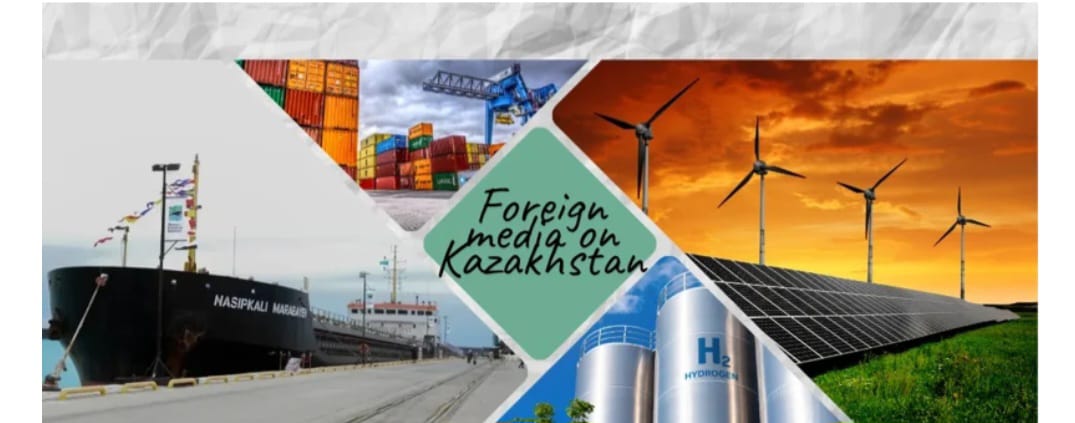Based on recent news about Kazakhstan strengthening trade ties with Pakistan, advancing its green hydrogen transition, and launching a new terminal at Kuryk Port.
Dawn: Pakistan, Kazakhstan to sign transit trade pact
Pakistan and Kazakhstan have agreed to finalize a Transit Trade Agreement enabling Kazakh goods to move through the Pakistani ports of Karachi, Bin Qasim, and Gwadar, while engaging other landlocked states to open regional trade corridors, Dawn reports.
The agreement followed the 13th session of the Intergovernmental Commission, where seven MOUs were signed in transport, trade, education, and culture. Both sides agreed to “accelerate finalisation of the Transit Trade Agreement” and implement the “Roadmap for Trade and Economic Cooperation.”
Emphasis was placed on regional connectivity, including the Kazakhstan-Turkmenistan-Afghanistan-Pakistan and Kazakhstan-Uzbekistan-Afghanistan-Pakistan routes, noting that “it was agreed to promote their use under the International Motor Transport Agreement.”
The launch of a Jebel Ali–Almaty multimodal trade corridor via Pakistan was hailed as a milestone. Cooperation will expand in logistics, agriculture, finance, education, IT, and tourism, including plans to open cultural academies and name streets in Astana and Islamabad after Muhammad Ali Jinnah and Abai Qunanbaiuly.
Euractiv: Unlocking Kazakhstan’s hydrogen future, EU encouraged to increase support
Kazakhstan’s transition to green energy is complex, with green hydrogen currently playing a limited role in its industry, though interest is growing, Euractiv reports.
With vast renewable resources and strategic positioning, the country is seen as a future player in the hydrogen market, both regionally and for EU supply.
Germany recently hosted green hydrogen training in Astana, where Vice Minister of Energy Bakytzhan Ilyas and German Ambassador Monika Iwersen highlighted Kazakhstan’s potential.
The EBRD sees strong prospects for green and blue hydrogen production, especially given Kazakhstan’s location on the Silk Road and domestic industrial demand. However, UNECE warns of water scarcity challenges and recommends focusing on blue hydrogen as a transitional step.
The Energy Ministry’s 2040 hydrogen plan aims for 50% green output, but experts, including the Hydrogen Diplomacy Office, stress that the transition remains difficult. Still, Kazakhstan’s energy export experience and geography support its ambition to supply Europe via routes like the Trans-Caspian corridor.
President Tokayev has launched a regional green energy initiative with Azerbaijan and Uzbekistan to reach the EU, which is looking to reduce dependence on Russian energy. However, the Carnegie Endowment advises Kazakhstan to focus first on using green hydrogen to decarbonise domestic industries before prioritising exports. With EU support for regulation, investment, and innovation, Kazakhstan could become a regional leader in clean industrial growth.
Jan De Nul: New terminal launched at Kuryk Port, Kazakhstan
Kuryk Port, a key hub on the Middle Corridor linking the Caspian and Black Seas, has expanded its cargo capacity with the launch of the Sarzha Terminal, Jan De Nul reports.
Jan De Nul’s Cutter Suction Dredger Vesalius and its specialised crew completed extensive dredging works under challenging conditions, enabling safe navigation for large grain vessels and container feeders.
“Our team is proud to have contributed to this milestone project, enhancing Kazakhstan’s maritime logistics infrastructure and strengthening its strategic position in the Caspian region as a hub for Trans-Caspian Corridor transportation,” said Stefan Muntoiu, Business Development Manager at Jan De Nul.
The Middle Corridor, seen as a key alternative to Russian and Suez routes, faces capacity bottlenecks, prompting Kazakhstan to accelerate maritime infrastructure upgrades.
“The Middle Corridor will have a big economic impact on the region. The Turkish, Georgia and Kazakhstan governments are making firm decisions to develop it. We are proud to take part in the development of this important trade route,” Muntoiu added.
Caspian News: Kazakhstan approves $1.4B wind energy deal with UAE
Kazakhstan has ratified a major agreement with the UAE to build a one-gigawatt wind power plant and a 300 MW energy storage system in the Zhambyl region, in partnership with Masdar, Caspian News reports.
Approved by the Mazhilis and originally signed in Dubai in December 2023, the project marks a key step in Kazakhstan’s green transition.
“The purpose of the agreement is to build a one-gigawatt wind power plant and a 300 MW energy storage system in the Zhambyl region together with Masdar,” said Energy Minister Erlan Akkenzhenov.
The plant will consist of two 500 MW wind farms, expected to generate 3.4 billion kWh annually and cut CO₂ emissions by nearly two million tons. The integrated storage system—the first of its kind in Kazakhstan—will help stabilise the grid and train local professionals in advanced renewable technologies.
The $1.4 billion investment is projected to create around 1,000 construction jobs and 100 permanent roles, with 425 km of new transmission lines boosting national energy security.
“This project is a major milestone in Kazakhstan’s renewable energy efforts,” Akkenzhenov noted, adding that it will raise the share of renewables by three percent and deepen climate cooperation with the UAE.
Cornish Times: Four friends to drive 4,000 miles in old banger for charity
According to Cornish Times, four friends from Cornwall are driving an old Peugeot 106 and a motorbike from Land’s End to Kazakhstan this summer as part of the Mongol Rally to raise funds for three charities: Cool Earth, Cornwall Mind, and CoppaFeel!
Covering 4,000 miles in July and August, the team—Matt Cannon, Emily Sorrell, Kieran Bland, and Joe Payne—met at Falmouth University and plan to film their journey.
“Kernow to Kazakhstan” follows the rally’s rules: no set route, a vehicle with a 1-litre engine or less, and a mission to raise money for good causes.


